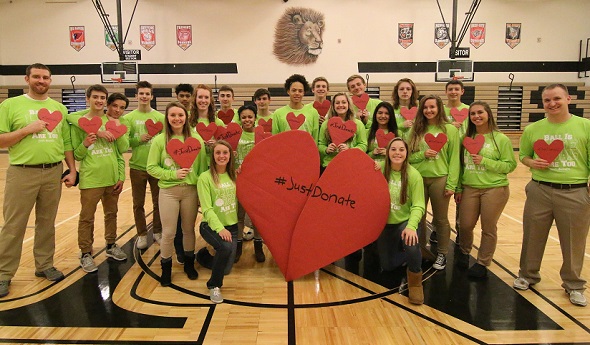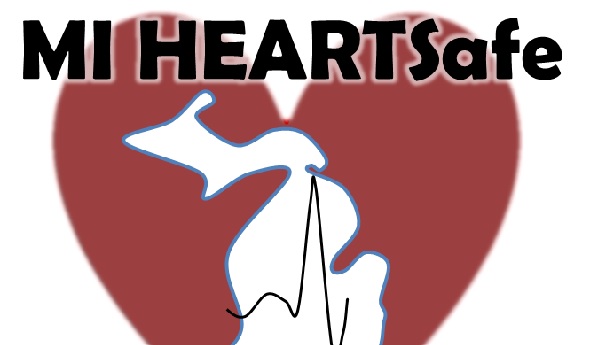
Ottinger's 'Organ Game' a Slam Dunk
May 23, 2017
By Geoff Kimmerly
Second Half editor
Every time Justice Ottinger sees one of the neon green T-shirts he designed on a student in the hallways at Newaygo High, he remembers fondly the “Ball Is Life, Organs Are Too” basketball game he planned this winter as an intern in the school’s athletic office.
 Much more frequently, the Lions’ senior gives thanks for the family friend who inspired the event by giving Ottinger a kidney last June.
Much more frequently, the Lions’ senior gives thanks for the family friend who inspired the event by giving Ottinger a kidney last June.
Ottinger is a recipient of an MHSAA/Lake Trust Credit Union “Community Service Award” for his creation of the “Ball Is Life, Organs Are Too” event on Jan. 20 that raised more than $4,000 for Gift of Life Michigan and provided an opportunity for 13 people to register as organ donors.
As noted, the event started as an assignment from Newaygo athletic director Kristen Melvin to create and organize some sort of benefit game. It turned into an opportunity for Ottinger to not only spread the word about something that’s given him a better life, but also a chance to honor donor “Uncle” Tom Linsley for doing so.
“As soon as she said it, I said ‘organ game.’ There was nothing else. Organs mean so much,” Ottinger said. “There are a lot of people waiting for organs, and I don’t think people know the seriousness of this as much as they should. (I did it) just to get people to be aware of that, that organ transplants are a big deal, organ donation is a big deal, and I’m a believer everyone should be signed up to be organ donors.”
The Community Service Awards recognize contributions by Michigan’s high school student-athletes away from the field. Ottinger, a three-sport athlete, will user the $1,000 award as a scholarship toward his education at Cornerstone University, where he’ll begin studies toward his goal of becoming a doctor. Six honorees total are receiving awards this spring; Second Half is featuring one a day this week.
Just last weekend, Ottinger won Lower Peninsula Division 3 Regional championships in the 110 and 300-meter hurdles, advancing to next week’s MHSAA Track & Field Finals in both events. It was a performance that showed how much the kidney has affected him physically. His 15.43 time in the 110 race was a personal record and 1.4 seconds faster than his best all of last year. His 300 time of 41.38 was his second-fastest this spring and more than three seconds faster than his best in 2016. He’s undefeated in the 300 this season.
Compare that to a year ago, when Ottinger “was doing it, but not doing it very good. I was still putting forth my best effort, and stuff like that, but the closer I got to the transplant date, in basketball and track more I could tell. I’d fall asleep all the time,” he said.
“Once I had a transplant, it was the total opposite.”
Ottinger’s family knew he’s need a kidney transplant eventually since he was 2 years old. Although it was a slow process, his kidneys gradually lost their ability to function over the next 15 years; by last summer, they were down to functioning at only six perfect effectiveness.
 He was set to begin dialysis last summer when a donor was found – Linsley, who Justice affectionately calls “Uncle,” his dad’s best friend from when they attended Newaygo a generation ago.
He was set to begin dialysis last summer when a donor was found – Linsley, who Justice affectionately calls “Uncle,” his dad’s best friend from when they attended Newaygo a generation ago.
Ottinger returned to play soccer in the fall and basketball in the winter, and set up his event for the Lions’ home game against Grant. Local businesses sponsored the event, and players and coaches wore the neon green shirts Ottinger designed. So did plenty of other people.
With Justice on the court, his mother Julie Long took over running the fundraiser during the game. But she had to get her son’s OK during warm-ups to order an additional 300 shirts – the first batch had sold out.
Gift of Life also sent a representative to sign up new donors on the spot, and Ottinger said the monetary donation will be used to help people who have had transplants pay hospital bills and for other costs that come with receiving a new organ.
He’s hopeful Newaygo will put on the event again next season, and Ottinger would like to do something similar at Cornerstone, where he’s set to join the track & field team.
His desire to become a doctor is boosted by what he’s experienced medically. But it’s rooted in something he’s already begun to fulfill.
“I’ve been in the hospital a lot, so I’d say that’s partially (the motivation),” Ottinger said. “But partially, I always have this urge to help people, make life better for people, and that’s driven me to do it too.”
The Community Service Awards are sponsored by the Michigan High School Athletic Association and Lake Trust Credit Union to recognize student-athletes' efforts to improve the lives of others in their communities. In addition to the $1,000 award, the Lake Trust Foundation is awarding an additional $500 to each honoree, to be donated to a non-profit, 501 (c)(3) organization of the awardee’s choice.
PHOTOS: (Top) Justice Ottinger (center of photo) and some of his many Newaygo supporters hold up #JustDonate hearts while wearing T-shirts he designed for his “Ball Is Life, Organs Are Too” event. (Middle) Ottinger presents a check to Gift of Life Michigan. (Photos courtesy of Justice Ottinger.)
2017 Community Service Awards
Sunday: Colon "Yard Squad" - Read
Monday: Bailey Brown, Brighton - Read

105 Schools Recognized As HEARTSafe
October 19, 2016
The Michigan Departments of Health and Human Services (MDHHS), and Education (MDE); American Heart Association (AHA); Michigan High School Athletic Association (MHSAA); and Michigan Alliance for Prevention of Sudden Cardiac Death of the Young (MAP-SCDY) have awarded 105 schools in Michigan with the MI HEARTSafe School designation which recognizes schools that are prepared to respond to cardiac emergencies.
“Many sudden cardiac deaths that claim the lives of children and young adults could be prevented through screening, detection, and treatment,” said Dr. Eden Wells, chief medical executive of MDHHS. “Appropriate medical response within three to five minutes is crucial for increasing the chance of survival, which is why I’m pleased to see so many of our schools taking vital measures to prepare and address this health issue.”
In order for a school to receive a MI HEARTSafe School designation, it must perform at least one cardiac emergency response drill per year, have a written medical emergency response plan and team, have current CPR/AED certification of at least 10 percent of staff, 100 percent of head varsity coaches, and 50 percent of P.E. staff; have accessible, properly maintained and inspected AEDs with signs identifying their location; and ensure pre-participation sports screening of all student athletes using the current physical and history form endorsed by the Michigan High School Athletic Association.
“We are so proud to support Michigan’s HEARTSafe schools,” said State Superintendent Brian Whiston. “Ensuring schools are prepared for sudden cardiac emergencies through planning, training, and life-saving AEDs is an important part of having safer learning environments for students, staff, and the community.”
Between 2003 and 2012 in Michigan, there were 2,590 young individuals between 1 and 39 years of age who died of sudden cardiac death. Of those, 214 were between 5 and 19 years of age. This is the third year of the MI HEARTSafe Schools program in Michigan. In the first two years of the initiative, 162 schools were previously designated as MI HEARTSafe Schools and prepared to help reduce the number of sudden cardiac deaths in our youth.
Public Act 12 of 2014 requires all schools (grades kindergarten to 12) to have a cardiac emergency response plan in place. This MI HEARTSafe School designation recognizes the 267 school buildings that have taken steps above and beyond to prepare to respond in the event of a cardiac emergency, and is awarded for a period of three years. Click for the list of designated schools.
Schools that meet all of the requirements will be able to apply for the MI HEARTSafe School designation each year. Click for information about the MI HEARTSafe Schools program.

